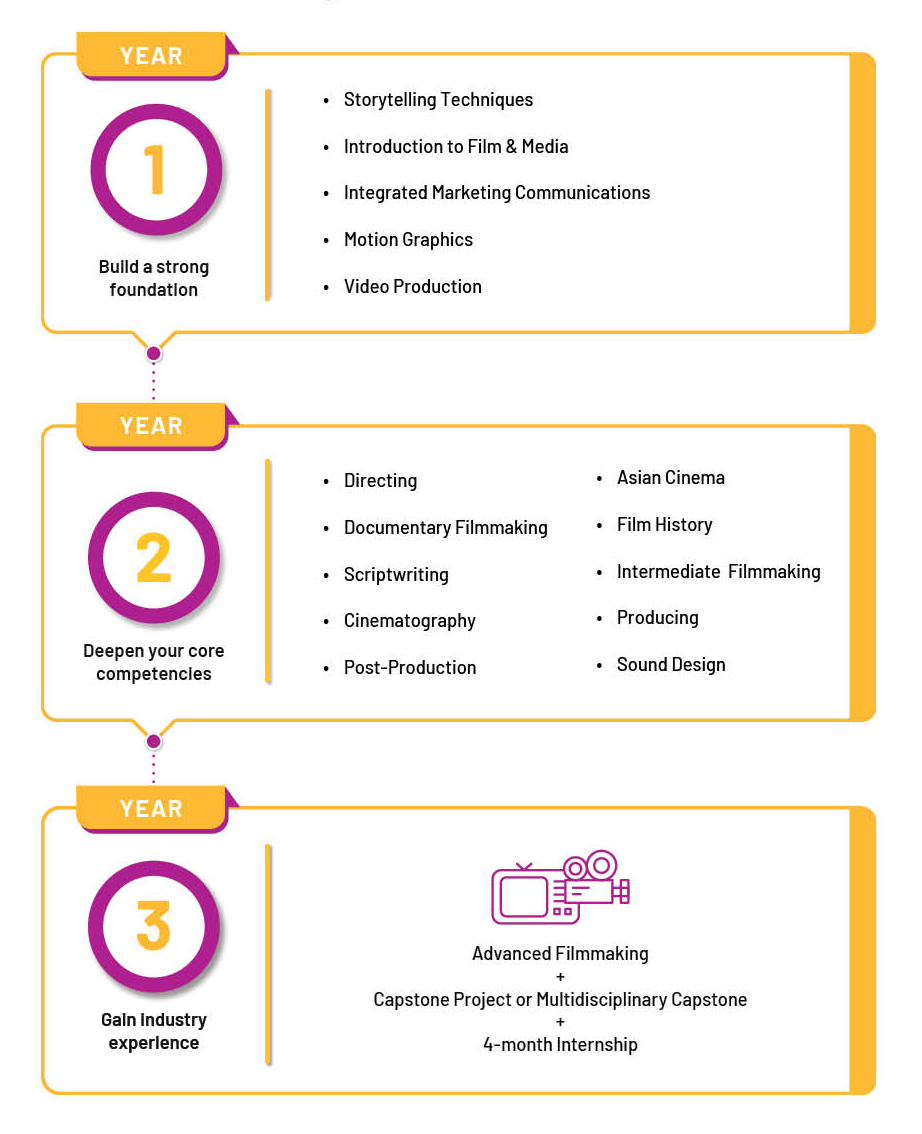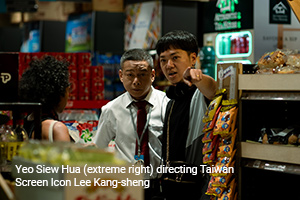Why FSV?
- Pay homage to the art of filmmaking at Singapore’s most established filmmaking course!
- Join the league of our illustrious and award-winning alumni and lecturers
- Attend masterclasses and workshops by world-renowned filmmakers and industry experts
- Learn in top-notch industry-standard facilities that inspire you to build a winning portfolio
About FSV
Do you find yourself spending hours captivated by stories in movies, TV shows and online platforms such as YouTube, Netflix and Disney+? With our Diploma in Film, Sound & Video (FSV), you can master the art of storytelling that resonates with audiences across various media platforms. Whether your passion lies in filmmaking or the broader landscape of digital media, our course prepares you for the film industry and beyond.
Bring your ideas to life using the latest technology as you create your own short film, embark on an internship, and complete a capstone project. Our rigorous curriculum ensures you’ll be ready to hit the ground running in this industry, whether locally or abroad. You will also be equipped to enter the growing field of commercial video production, driven by the rise in digital media consumption.
At FSV, you will build a strong foundation in both the artistic and technical aspects of filmmaking. Hone your skills in areas like scriptwriting, sound, cinematography, motion graphics and post-production. You will also get to build your theoretical foundation by learning from the masters of cinema in our cinema studies classes.
Sharpen your technical skills through hands-on exposure to the latest industry-standard equipment, including HD digital cameras and established post-production tools such as Premiere Pro, ProTools and DaVinci Resolve. Plus, you will have access to top-notch facilities such as a film sound stage and a full HD television studio.
FSV graduates have been hired for exciting
projects in the local and overseas film and media
industry, such as Ah Boys to Men and Stranger
Eyes – the first Singaporean film to compete for
the Golden Lion at the Venice Film Festival – to
wide release films such as Crazy Rich Asians and
Star Wars: The Last Jedi.
Design Your Own FSV Journey

Further Studies
You will enjoy advanced standing for degree programmes at top film and media schools, both locally and abroad. Many FSV graduates have also received scholarships and bursaries from the National Arts Council, Singapore Film Commission and the Infocomm Media Development Authority to pursue further studies at National University of Singapore, Nanyang Technological University, Stanford University (US), University of Cambridge and the National Film & Television School (UK).
Careers
Your portfolio, experience and skills pave the way for you to carve out your own career path in the film and media industry. Or you can use the skills you acquire to pursue careers in different fields. You can look forward to roles such as:
- Content Developer
- Cinematographer
- Director
- Editor
- Gaffer
- Location Manager
- Location Sound Recordist
- Motion Graphics Designer
- Post-Production Supervisor
- Producer
- Production Designer
- Production Manager
- Sound Designer
- Scriptwriter
Entry Requirements
AGGREGATE TYPE ELR2B2-A
To be eligible for consideration, candidates must have the following GCE ‘O’ Level examination (or equivalent) results.
| Subject | 'O' Level Grade |
|---|---|
| English Language | 1-6 |
| Additional Mathematics/Mathematics | 1-7 |
| Any one of the 1st group of Relevant Subjects for the ELR2B2-A Aggregate Type | 1-6 |
Applicants must also fulfil the aggregate computation requirements for the ELR2B2-A Aggregate Type ( English Language, 2 relevant subjects and 2 other best subjects) listed at www.np.edu.sg/docs/ELR2B2.pdf .
For students with other qualifications, please refer to the NP website for the entry requirements and admissions exercise period.
Candidates with severe vision or hearing deficiency may encounter difficulties meeting the course requirements and expectations. Those with colour vision deficiency are required to declare this condition at enrolment, as certain modules require colour recognition.
What You Will Learn
Introduction to Film & Media (4 Credit Units)
This module examines multi-platform content and the digital platforms and technologies by which the content is delivered (virtual conferences, streaming, blogs, social media, online videos, immersive experiences). Students will appreciate and analyse a variety of media with different perspectives based on multiple platforms to reach an audience. By the end of the module, students will become more literate “producers” and critics of multi-platform media today.
Integrated Marketing Communications (4 Credit Units)
This module introduces students to the basic principles and concepts of marketing communications, with an emphasis on promotion in marketing. Students will learn about marketing and how its promotional elements must be integrated to communicate effectively. Students will apply basic skills in research and market analysis to plan and develop a marketing communications campaign.
Video Production (4 Credit Units)
This is a foundation module introducing students to single-camera video production. The module gives students hands-on experience with pre-production planning, single-camera operation, location lighting, grip work, sound recording and non-linear video editing. Students will gain an understanding of working with moving images and learn to combine them with simple soundtracks to create compelling content.
Storytelling Techniques (3 Credit Units)
This module scaffolds and synthesises storytelling, functional writing, and research techniques, to create engaging multi-platform content. Through the module, students will be taught the tools to effectively ideate compelling story and content ideas
and efficiently craft considered and professional written treatments and proposals, with which to present their content and engage audiences across media platforms.
Motion Graphics (4 Credit Units)
This module gives students hands-on experience in creating motion graphics for digital media. Students will be taught skills such as visual design and the creation of computer-generated graphics in service of multi-platform commercial media productions
(video, immersive media, social media, etc.).
Career & Professional Preparation 1 (1 Credit Unit)
This module gives students a foundational introduction to their three-year diploma course curriculum and how it prepares them for industry. Through guided reflection of their personal characteristics and the development of an overall game plan for their
education and career goals, students will be better prepared for their future careers.
English Language Express* (Credit Units - NA)
English Language Express aims to give you a better grounding in the English Language and to strengthen the written and oral communications skills that you will need in your academic and professional careers. You will be engaged in writing, reading, listening
and speaking activities that will develop your ability to speak and write grammatically, coherently and clearly. You will also hone your reading and listening comprehension skills.
Health & Wellness^ (1 Credit Unit)
This is a Level 1 Core module for all Year 1 students. The module will introduce students to the importance of maintaining both physical and mental health through the knowledge and monitoring of health indicators, and application through appropriate exercises. The aim of the module is to empower students with basic knowledge and skills to be independent and responsible in maintaining overall personal health.
^ Critical Core modules account for 10 credit units of the diploma curriculum. They include modules in innovation and world issues, as well as an interdisciplinary project. By bringing students from diverse diplomas together, the interdisciplinary project fosters collaboration to explore and propose solutions for real-world problems. NP aims to develop students to be agile and self-directed learners, ready for the future workplace.
TV Production (4 Credit Units)
Students are introduced to multi-camera studio production techniques and technical operations. Topics include TV studio camera operation and setup, studio lighting, audio and sound control, the character generator, teleprompting, vision mixing, digital effects and production roles. The module is designed to help students acquire the basic knowledge and skills to fill various studio positions competently. There is a focus on developing creativity and continuity in planning and executing live studio-based television programmes.
Audio Technology (4 Credit Units)
Students are taught the knowledge and skills for audio production here. They will learn the basic principles and technical concepts of sound production and technology. Foundational production skills developed in recording, overdubbing, processing and mixing can be applied to produce audio for video, television, film, radio and music products.
Photography (3 Credit Units)
This module explores the technical and aesthetic aspects of still photography. Topics include the use of digital camera, exposure techniques, use of existing light, visual elements and principles of design in photography, concepts of composition, storytelling with pictures and photo-portfolio preparation.
Editing (3 Credit Units)
This module provides introductory knowledge in the area of post-production as well as hands-on editing experience. Students will learn the finer details of editing for a narrative-driven project. Through exercises and reflection, they will have many opportunities to become familiar with the various concepts of editing.
The VOICE module aims to empower students to become thoughtful and confident communicators able to tailor a message to suit audience, purpose and context. Students will learn how to use storytelling structures and techniques, persuasive strategies and effective visuals to connect meaningfully with their audience. Through a personalised growth plan, the module encourages students to reflect, set goals and take ownership of their growth and development as communicators. The module employs engaging teaching strategies such as games, thinking routines, masterclasses and workshops, and a celebratory showcase festival at the end to make learning fun and exciting.
Innovation Made Possible^ (3 Credit Units)
This module aims to help students discover and hone their innate ability to think creatively and come up with innovations to tackle problems close to their hearts. Underpinned by the Design Thinking framework, students will be sensitised to the process of user-centric problem solving. They will be introduced to concepts such as empathy, problem-definition, ideation, prototyping and testing through a practical approach featuring engaging out-of-classroom activities, just-in- time master-classes and a hands-on, “learning by doing” delivery format. Ultimately, the module will help students recognise that innovation is attainable and fun and develop creative confidence to explore new ideas in their studies and beyond.
^ Critical Core modules account for 10 credit units of the diploma curriculum. They include modules in innovation and world issues, as well as an interdisciplinary project. By bringing students from diverse diplomas together, the interdisciplinary project fosters collaboration to explore and propose solutions for real-world problems. NP aims to develop students to be agile and self-directed learners, ready for the future workplace.
Film History (4 Credit Units)
Film History is an introductory survey course that examines the social, technological and aesthetic history of filmmaking from the origins to the present. This course will emphasise critical, theoretical and historical perspectives in analysing film. Special attention will be placed on films and film movements outside the mainstream. The focus will be on the history of film from a Western perspective, primarily American and European.
Scriptwriting (4 Credit Units)
Students learn to write screenplays for short films. Building on storytelling and visualisation techniques they acquired in Level 1, students are encouraged to develop stories from their own observations, memories and experiences. Writing exercises and assignments develop eventually into an 8- to 12-page screenplay, which may be expanded into projects in Level 3.
Cinematography (4 Credit Units)
Students gain a better understanding of the aesthetics and craft of cinematography with special concentration on practice, workflow and safety at a professional standard. The module aims to take learning outside the classroom with tutor-guided masterclasses conducted in locations that are researched and sourced by the students. This makes for more dynamic and active learning that mimics real-world conditions.
Post Production (3 Credit Units)
This module provides an opportunity to create motion graphics in post-production for intermediate level students who have mastered the fundamental principles and skills of editing and video production. Students will build up their capacity to create contents
of motion graphics and train technical skills for post-production. Students will deal with the various concepts of motion graphics and workflows in post-production. This will help students prepare for their capstone projects in their final year.
Documentary Filmmaking (4 Credit Units)
This module is designed to expose students to the practical, technical and theoretical issues in nonfiction filmmaking. Students will study different types of documentary storytelling and the appropriate use for each style. They will then work individually and later in groups to apply the technical skills and creative choices to shoot and edit their own video documentaries.
World Issues: A Singapore Perspective^ (2 Credit Units)
This module will expose you to a wide range of global issues viewed and discussed in the context of Singapore as a nation state. You will be guided to critically examine current affairs from various perspectives and develop an appreciation of the dynamism behind real world problems and possible solutions. The intent of this module is to develop thinking students with well-considered perspectives who are able to articulate reasonable opinions, make thoughtful decisions and informed choices as active citizens in society. You will also be exposed to a multidisciplinary approach in the mitigation of global challenges and thus be adequately prepared to handle the Year 3 interdisciplinary project – Project ID.
^ Critical Core modules account for 10 credit units of the diploma curriculum. They include modules in innovation and world issues, as well as an interdisciplinary project. By bringing students from diverse diplomas together, the interdisciplinary project fosters collaboration to explore and propose solutions for real-world problems. NP aims to develop students to be agile and self-directed learners, ready for the future workplace.
Directing (3 Credit Units)
Students learn aspects of pre-scriptwriting, scene direction, completion of scriptwriting, script visualisation, pre-production, acting, blocking, direction, rehearsal and filming. The focus is on equipping students with the essential skills to become competent directors and to build a creative portfolio.
Asian Cinema (5 Credit Units)
The module introduces students to the art and business of Asian cinema. Students will explore the unique traditions of selected national cinemas of East-, South- and Southeast Asia. Against the backdrop of globalisation, they will also discover the unique histories and aesthetics of Asian film production.
Producing (3 Credit Units)
This module introduces students to the scope of work and responsibilities of a Producer. Students will be introduced to the fundamentals of budgeting and scheduling, the film crew hierarchy, the basics of location scouting and local media law. This module will also include the mechanics of a script breakdown plus the process of content creation and pitching. At the end of this module, students will be able to present a production portfolio based on a given script.
Intermediate Filmmaking (4 Credit Units)
Building on the conventions learnt in first-year modules Location Filmmaking and Storytelling Techniques, students delve to examine the craft deeper and discover principles that make for an affective film. This class is exploratory in nature and students chart their own learning journey through guided filming projects and intimate group discussions.
Sound Design (3 Credit Units)
Students will learn the basic knowledge and skills needed for capturing good sound on location in support of sound design. They will also learn how Sound Design can be used to complement and enhance films with the use of foley, voiceover and ADR. With an introduction to ProTools, students will be able to produce basic sound tracks for short films through location sound recording, sound design, editing and mixing.
Career & Professional Preparation 2 (2 Credit Units)
This second-year module is designed to equip students with the necessary skills to seek and secure work, as well as communicate their personal brand. The module will help students better understand their course-related media sectors and equip them with the necessary skills – written, verbal and presentation – to market themselves effectively when pursuing a career in the media industry.
Advanced Filmmaking (8 Credit Units)
Building on skills acquired in their first two years of study, students complete two short films that allow them to hone their abilities in writing, cinematography, lighting, sound recording, editing and sound mixing. The students will develop a conceptual knowledge of different film styles and enhance their understanding and competence in issues related to content and storytelling. The "inclass" and "on location" assignments will emphasise the shooting procedure and working with actors on a set. Part of the class will be delivered in the masterclass method of instruction.
Capstone Project (10 Credit Units)
Using the conceptual and applied knowledge learnt in Year 1 and 2, students hone and integrate their skills through managing and operating the school’s flagship business units, working with external clients on real-time projects, working on their own projects in various disciplines and across disciplines or carrying out freelance engagements. All projects will provide students with hands-on experience in incorporating various skills, platforms and mechanisms to achieve the desired impact in the marketplace.
Industry Immersion Programme I (10 Credit Units)
Students who prefer more working experience can opt for this programme, allowing them to work for one year with our partner organisations such as Mediacorp, mm2 Entertainment and The Smart Local.
Project ID: Connecting The Dots^ (4 Credit Units)
^ Critical Core modules account for 10 credit units of the diploma curriculum. They include modules in innovation and world issues, as well as an interdisciplinary project. By bringing students from diverse diplomas together, the interdisciplinary project fosters collaboration to explore and propose solutions for real-world problems. NP aims to develop students to be agile and self-directed learners, ready for the future workplace.
Internship (Local/Overseas) (16 Credit Units)
Students will be placed on an internship with companies and agencies matching their abilities and interests. The internship gives students opportunities to apply their acquired knowledge and skills to the work environment. Students gain valuable work experience and exposure to the rigour, demands and excitement of the media industry, enabling them to adapt effectively to future employment. Many of our students are offered employment by these same companies.
Industry Immersion Programme II (16 Credit Units)
Students who prefer more working experience can opt for this programme, allowing them to work for one year with our partner organisations such as Mediacorp, mm2 Entertainment and The Smart Local.




